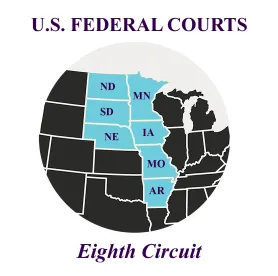The US Court of Appeals for the Eighth Circuit affirmed a district court’s dismissal of a trade secret lawsuit against a consultant that allegedly failed to prevent its client from disclosing its own proprietary information during a call with a potential buyer. Protégé Biomedical, LLC v. Duff & Phelps Securities, LLC, and Philip I. Smith, Case No. 21-1368 (8th Cir. Apr. 4, 2022) (per curiam) (Erickson, J., dissenting).
Protégé entered into an agreement with Duff & Phelps to help Protégé find a buyer for its business. Under the agreement, Duff & Phelps received immunity from certain types of claims, its employees were shielded from individual liability and it owed no fiduciary duties to Protégé.
One of Protégé’s competitors, Z-Medica, was identified as a potential buyer. One of Duff & Phelps’s employees, Philip Smith, facilitated execution of the non-disclosure agreement (NDA) by a member of Z-Medica’s board of directors. Protégé assumed that the NDA would also bind Z-Medica and thus participated in conference calls with Z-Medica in which Protégé revealed non-public information. In Z-Medica’s view, however, the board member signed the NDA in his personal capacity and not as Z-Medica’s representative. As a result, Z-Medica used the information it received from Protégé to create its own competing product.
Protégé sued Z-Medica. After settling with Z-Medica, Protégé sued Duff & Phelps and Smith in state court for breach of contract, unlawful practice of law, negligence, breach of professional services and breach of fiduciary and principal-agent duties. Duff & Phelps removed the case to federal court on the ground that Smith, the only non-diverse defendant, had been fraudulently joined. The district court dismissed the case for failure to state a claim. Protégé appealed.
The Eighth Circuit first analyzed whether the case belonged in federal court. The Court upheld the district court’s determination that Smith was fraudulently joined. The Court stated that fraudulent joinder occurs when there is no reasonable basis in fact and law for the claims brought against the non-diverse defendant. Here, the Court found that there was no reasonable basis for Protégé to allege breach of contract against Smith since he was never a party to the contract between Protégé and Duff & Phelps. The Court found that Protégé’s unlawful practice of law claim against Smith also constituted fraudulent joinder because Smith never gave legal advice to Protégé. The Court noted that the contract immunized Smith from Protégé’s other claims and thus, without any viable claims against Smith, the case was properly in federal court under 28 U.S.C. § 1332.
Turning to the merits of the claims against Duff & Phelps, the Eighth Circuit affirmed the dismissal for failure to state a claim. The Court reasoned that Protégé’s breach of contract claim was predicated on an alleged failure by Duff & Phelps to prevent Protégé from disclosing its proprietary information. However, the agreement only made Duff & Phelps responsible for its own conduct, not for Protégé’s conduct. The Court explained that Protégé’s other claims failed for the same reason.
Judge Erickson dissented, disagreeing with the majority on the issue of whether Smith was fraudulently joined. In Judge Erickson’s view, there was no fraudulent joinder and the case should not have been dismissed against either party. In his view, Smith, acting on behalf of Duff & Phelps, signed both the contract and the NDA at issue and, therefore, it was not fraudulent to name the employer and the employee whose conduct had been called into question as a defendant. Because there was no fraudulent joinder (and therefore no diversity), jurisdiction was proper in state court.
If jurisdiction in federal court was proper, Judge Erickson would reverse the dismissal of the breach of contract, negligence and breach of professional services claims because the complaint was well pleaded and Duff & Phelps undertook the duty to obtain NDAs. He stated that it should be left to a fact-finder to determine whether Duff & Phelps’s conduct caused Protégé to disclosure its confidential business information and to determine whether that conduct amounted to gross negligence, ordinary negligence or no claim at all.



 />i
/>i
